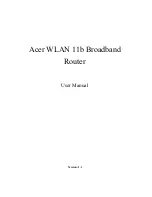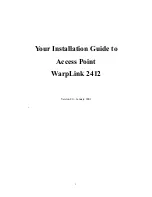
Chapter 4: Customizing Your Network Settings
|
49
N150 Wireless Router User Manual
Configuring a Device Name
The device name is a user-friendly name for the router. This name is shown in the Network
on Windows Vista and the Network Explorer on all Windows systems. The
Device Name
field cannot be blank. The default name is WNR1000v3h2.
Configuring LAN TCP/IP Setup Parameters
These are advanced settings that you might configure if you are a network administrator and
your network contains multiple routers. The router is shipped preconfigured to use private IP
addresses on the LAN side and to act as a DHCP server (see
Using the Router as a DHCP
Server
on page
50).
Note:
If you change the LAN IP address of the router while connected
through the browser, you will be disconnected. You must then open
a new connection to the new IP address and log in again.
The router’s default LAN IP configuration is:
•
LAN IP address.
192.168.1.1
•
Subnet mask.
255.255.255.0
These addresses are part of the designated private address range for use in private networks
and should be suitable for most applications. If your network has a requirement to use a
different IP addressing scheme, you can make those changes in this screen.
The LAN IP settings are:
•
IP Address
. The LAN IP address of the router.
•
IP Subnet Mask
. The LAN subnet mask of the router. Combined with the IP address, the
IP subnet mask allows a device to know which other addresses are local to it, and which
must be reached through a gateway or router.
•
RIP Direction
. RIP allows a router to exchange routing information with other routers.
The RIP Direction selection controls how the router sends and receives RIP packets.
Both
is the default.
-
When set to
Both
or
In Only
, the router incorporates the RIP information that it
receives.
-
When set to
Both
or
Out Only
, the router broadcasts its routing table periodically.
•
RIP Version
. This controls the format and the broadcasting method of the RIP packets
sent by the router. (It recognizes both formats when receiving.) The default setting is
Disabled
.
-
RIP-1
is universally supported. RIP-1 is usually adequate unless you have an unusual
network setup.
-
RIP-2B
carries more information than RIP-1 and uses subnet broadcasting.
















































